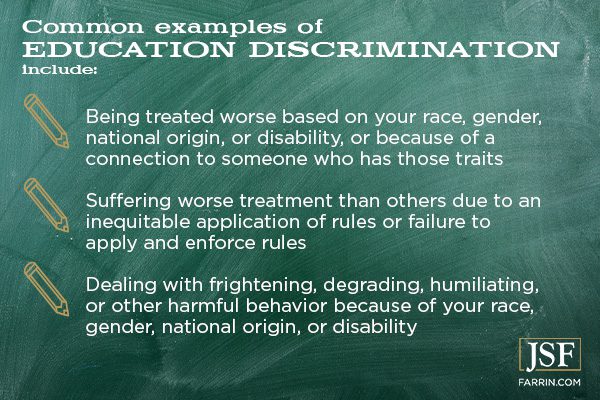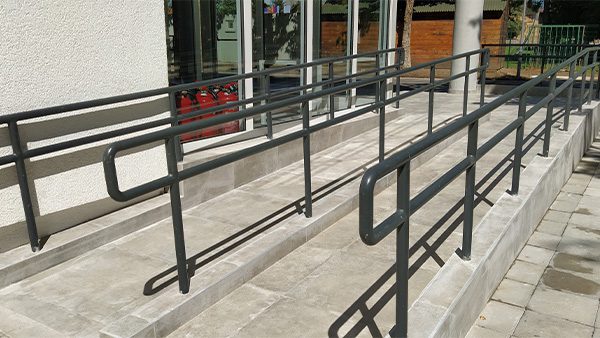
Have you, or your child, experienced education discrimination?
The law requires fair treatment at every level of schooling in North and South Carolina. If your civil rights were violated, you may be entitled to significant compensation.
Education Discrimination Lawyers in North and South Carolina
What Is Discrimination in Education?
It can sometimes be hard to spot, but discrimination in education is any action or inaction that results in depriving a protected class of the opportunity to receive an education or the benefits of that education. A protected class is any group of people as defined by law who are legally protected from discrimination.
Discrimination in education can have negative lifelong consequences for the victim.
Education discrimination can be race-based, sex-based, or directed at students with disabilities. Note: Discrimination does not have to be intentional to be illegal.
Whether the victim is a minority child, a child with special needs, someone with a disability, or an adult pursuing higher learning, education discrimination does happen in North and South Carolina.
However it happened, if your rights to equal educational access have been violated, an education discrimination lawyer can help you fight back and seek justice. For a free professional opinion on your case, call 1-866-900-7078 today.
Title VI – Racial Discrimination in Schools
Educational inequalities based on race have existed for as long as the education system itself. As late as the 1960s, Black, Hispanic, and Native American students were taught in schools entirely segregated from white students. And today, deep inequalities persist.
According to Title VI, “No person in the United States shall, on the ground of race, color, or national origin be excluded from participation in, be denied the benefits of, or be otherwise subjected to discrimination under any program to which this part applies.”
Specifically, the law prohibits individuals, organizations, and institutions receiving federal funding from, directly or through other arrangements, discriminatory actions against people on the grounds of race, color, or national origin.
Example discriminatory actions can include:
- Denial of any service, financial aid, or other benefit
- Provision of any service, financial aid, or other benefit that is different or provided in a different manner from that provided to others
- Segregation or separate treatment of an individual in matters relating to any service, financial aid, or benefit
- Restriction of the individual’s enjoyment of advantages or privileges enjoyed by others receiving the service, financial aid, or benefit
- Treatment that differs from others when determining admission, enrollment, or other requirements or conditions to qualify for service, financial aid, or benefit
- Denial of or failure to offer an individual the opportunity to participate, if others can participate
Essentially, if a program is receiving federal funds, it may not limit access to opportunities based on someone’s race, color, or national origin or substantially impair a person’s ability to accomplish the objectives of the program and benefit from its facilities. Title VI applies to a school’s employment practices, as well.
If you believe you’ve been the victim of discrimination under Title VI, contact an education discrimination lawyer as soon as possible. Title VI complaints must generally be filed within 180 days of the alleged discrimination, so don’t delay.
Title IX – Sex Discrimination in Schools
When many people think of Title IX, they think of college athletics and the funding of women’s sports programs. It covers a great deal more.
Title IX prohibits discrimination on the basis of gender, gender identity, gender expression, or sexual orientation in schools that receive federal funding and prohibits schools from turning a blind eye to discriminatory behavior.
Title IX applies to all levels of education, including K-12 schools. Note that the statute of limitations (how much time you have to bring your case) for Title IX complaints varies by state: generally three years in North Carolina and one year in South Carolina.
Title IX violations frequently include:
- Sexual harassment
- Rape
- Sexual assault
Depending on the circumstances, the following may also constitute discrimination under Title IX:
- Relationship violence
- Stalking
In South Carolina, Title IX cases have made the news repeatedly, unfortunately. From a high school girl’s parents suing the Lexington, S.C. school district for inequality in their youth sports programs to a male Coastal Carolina University student alleging sexual assault at the hands of a professor and a coverup by the university, alleged Title IX violations continue to occur.
This area of law can be incredibly broad and is easily misinterpreted. If you believe you’ve suffered education discrimination, don’t hesitate to contact an education discrimination lawyer today at 1-866-900-7078.
Section 504 and IEP – Discrimination Against Students With Disabilities
When it comes to discrimination against disabled students, some key laws in this area include Section 504 and the Individuals With Disabilities Education Act (IDEA).
Section 504 prohibits discrimination based on a person’s disabilities at any public school or college that accepts any type of federal financial assistance.
Section 504 covers all levels of school from kindergarten all the way through post-secondary education institutions like universities.
The IDEA was implemented to give each child the best opportunity to succeed and applies to children ages 3 through graduation (or age 21 if still in high school).
Under the IDEA, children with qualifying disabilities are generally entitled to an IEP (Individualized Education Plan) developed by an “educational team” to aid in their success. The IEP governs how the child is tested and graded, balancing disability accommodations with completion of coursework.
Note: Discrimination before post-secondary school may violate both laws, while discrimination at the college level generally would only trigger Section 504.
If you, or a loved one, have suffered education discrimination as a result of a disability, contact an education discrimination lawyer immediately to discuss your case.
Education Discrimination Lawyer Ready to Help You
Since our firm began, we’ve helped tens of thousands of people recover 100s of millions of dollars in total compensation.1 And that doesn’t include our leading role in one of the largest civil rights cases in U.S. history.
We don’t give up when a case gets hard. We put you first in everything we do, including taking your case to trial with our powerful litigation team as needed.
To help you pursue justice, we advance all costs of building your case. And if we don’t recover compensation for you, you pay no attorney’s fee at all. Guaranteed.2
With more than 60 attorneys and deep resources, we can help you. But don’t take our word for it: see what our happy clients have to say.1
Call us at 1-866-900-7078 or contact us online today. Our compassionate team will give you a free professional opinion on your case with no obligation.






